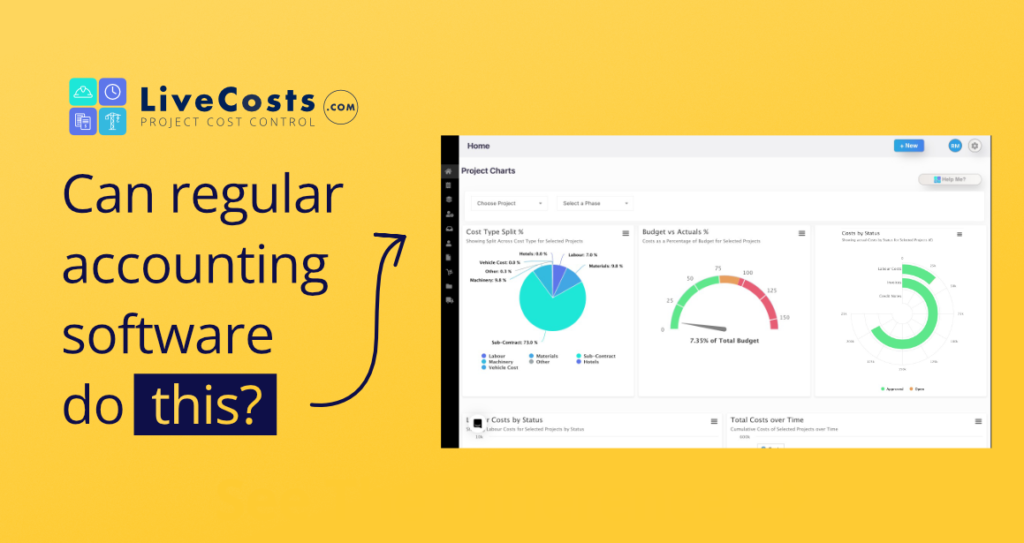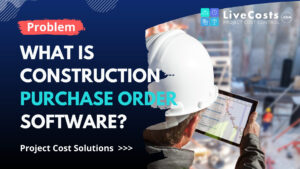Running a successful business usually means that you are focused on looking after your customers, growing sales, and improving profitability.
It also means that you are on top of your finances with accurate information so that you can make well-informed decisions, improve profits, and manage your cash flow.
In the last 10 years, financial processes have been swiftly moving from the desktop to cloud softwares with great benefits.
If you haven’t made the move yet, check out our previous blog on How To Choose The Right Construction Accounting Software For Your Company.
Although there is no doubt of the benefits of the cloud accounting software, they can only do parts of the construction cost tracking process.
Sure, it can do the basics for a small company but once a company has multiple projects, many users, and many complicated parts to a project, regular cloud accounting software becomes strained – and strains the company.
It generally doesn’t work for a medium or large-size construction company that can have multiple quantity surveyors, project managers, and that works with tens or hundreds of subcontractors.
Construction processes are too specific for a general accounting software to be able to do all of it. Below we discuss six reasons you need more than accounting software for a construction business.
Control User Access
One fundamental issue in using an accounting software for job cost tracking is user access control. You probably want your quantity surveyors, project managers, and possibly also your site team to be able to attach project and job information to costs that they have incurred.
One challenge with this is that you possibly do not want to give non-accountant users too much access to sensitive company information. You want the users to just access their projects and the jobs where they are doing something. With accounting software, there isn’t always a way to give access to just some parts of the financials. There are some options to allow time tracking or looking at reports, but that isn’t enough.
Mobile Capabilities
Along with general access, in construction we are not all sitting in front of a computer at all times and may not have Internet on occasions! Having the ability to complete tasks while on the move or on-site is important. Mobile apps for site personnel to track time, create purchase requisitions / orders, confirm deliveries is vital.
Construction Accounting Vs General Ledger Accounting
Construction accounting is different from General Ledger accounting in the way that the financial tracking is at the project level. In addition to the accounting ledger, ideally the project and cost types should be stored. This can get more complex with larger projects of course when trying to track against individual budget lines within a project. This granularity of data is very valuable in estimating future projects since the previous data is easily accessible.
In short, in addition to just tracking a company’s general financial performance, the performance of each job and project is also tracked. Oftentimes, the term job costing is used to describe the process of construction accounting. Job costing can be used in the context of both estimating a new project and also adding up the incurred costs on an ongoing project.
We have a detailed article on our blog about construction cost tracking that will give you a better overview. 8 Methods To Track Construction Project Costs And Increase Profitability.
Procurement Workflows in Construction Accounting Software
Accounting softwares will handle the accounts payable function of your business very well and keep you organized. In construction, workflows will be required long before an invoice is seen. If you consider materials or services that may be procured first, then initiated with a Purchase Order and confirmed with a delivery note, this process is running long before an invoice is received. This can leave these tasks being carried out outside the software and unconnected to your accounts.Construction Project Profitability Projections
For many construction companies, it is critical that the project profitability is known throughout the whole lifecycle of the project. This is not the case when a contract structure like cost-plus is used. This means that knowing the profitability of the project or a job is a matter of surviving. For example, let’s say you find out at the end of a project that your quoted cost of €100k is instead €120k. You might run into cash flow issues assuming you don’t have enough money in the bank.
Unfortunately, accounting softwares don’t really provide a good way of projecting the future profitability. It rather provides you different tools to look at your past costs and incomes. This means that there is no way to continuously see the profitability of the project when the project is still running. You might need to do this analysis in a different tool or try to solve this with a custom Excel spreadsheet.
Project Progress and WIP Reporting
Slightly connected to the project profitability is also the tracking current progress and remainder of the project. This task involves seeing how much of the project is finished when compared to the initial estimate and budget. An up to date project cost value is critical to keep track of so that you can compare it to the currently paid out expense amounts.
Since most accounting softwares are not specific to construction, it doesn’t really know too much about your estimations and budget. It also does not know anything about your initial estimate vs the current up to date costs of the project. It also means that compiling an accurate enough project progress report is not really possible.



